2009 Salary Survey of Embedded Developers
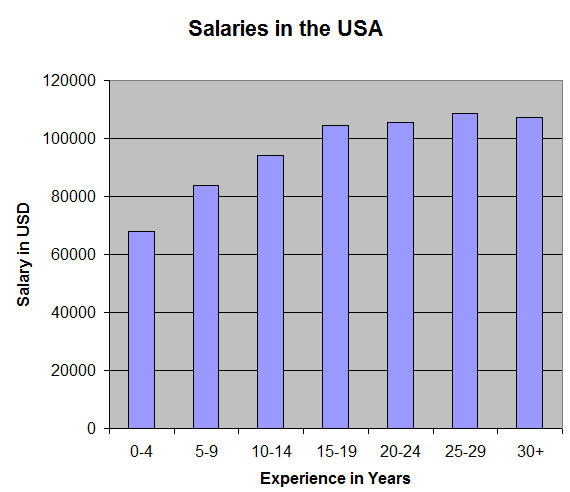
After the 2006 survey many respondents asked for data in the USA broken down by region. Here's a state-by-state analysis, with the number of respondents for each state:
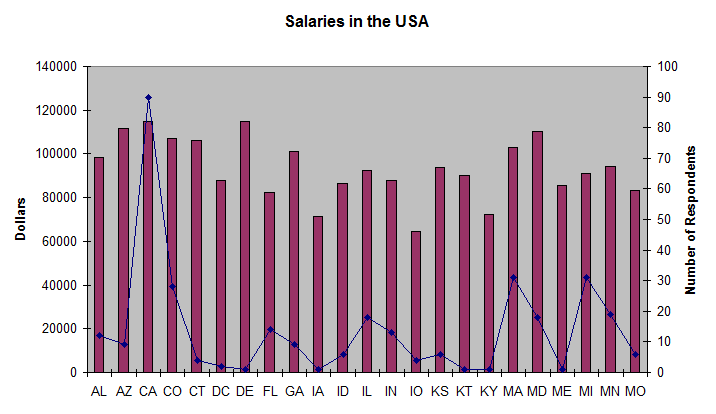
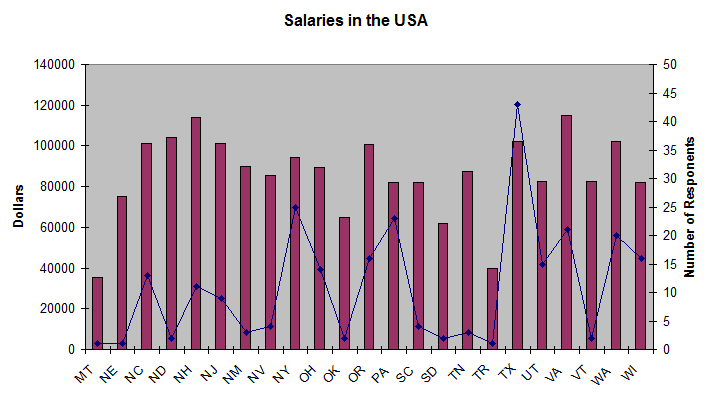
Happiness
Perhaps attempting to measure happiness is a fool's quest, but as a middle-aged gent who has seen too many colleagues burn out from despair and overwork I'm convinced we must pursue happiness first and salary second. In the survey respondents rated their happiness with their career on an enumerated scale of [love it, reasonably happy, somewhat unhappy, hate it]. I rated the factors from 3 (love it) to 0 (hate it). Those results were normalized to the number of responses in each category.
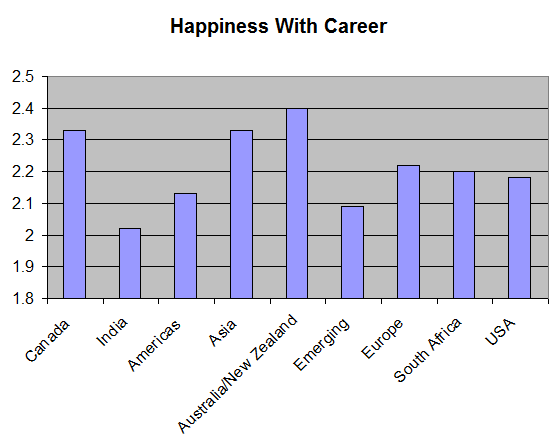
Compared to 2006, engineers overall are a bit unhappier with their career, though the scores for folks in India are up substantially.
Survey after survey shows that salary is typically around number 3 or 4 in what makes an engineer happy. Turns out that's greatly dependent on the region of the world. Here are correlation coefficients of salary versus happiness:
| Canada | -0.14 |
| India | +0.16 |
| Americas | +0.11 |
| Asia | -0.21 |
| Australia/New Zealand | +0.33 |
| Emerging | -0.09 |
| Europe | +0.14 |
| South Africa | -0.61 |
| USA | -0.14 |
Raises
Wondering about the current woeful economy's effect on raises, I asked about people's most recent raise, and anticipated next raise. Obviously the latter is tough to predict and so the results should be taken as sort of an impressionist painting of what to expect, rather than hard data. But I was frankly surprised to see that raises, while in general down over last year, still exist.
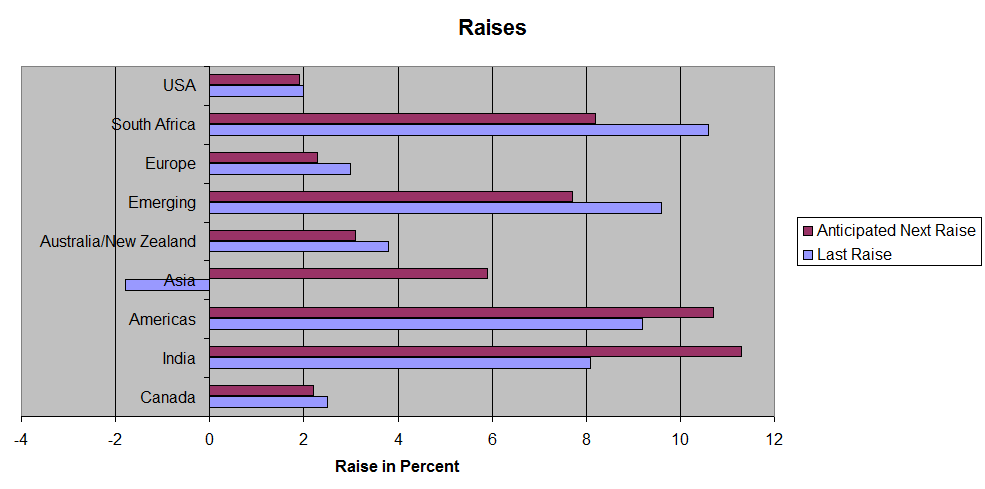
Hours Worked
We're working slightly harder than in 2006, with the average work-week up a few hours. But for the first time we have a new category: 0 to 34 hours per week. Are these two effects from the recession?
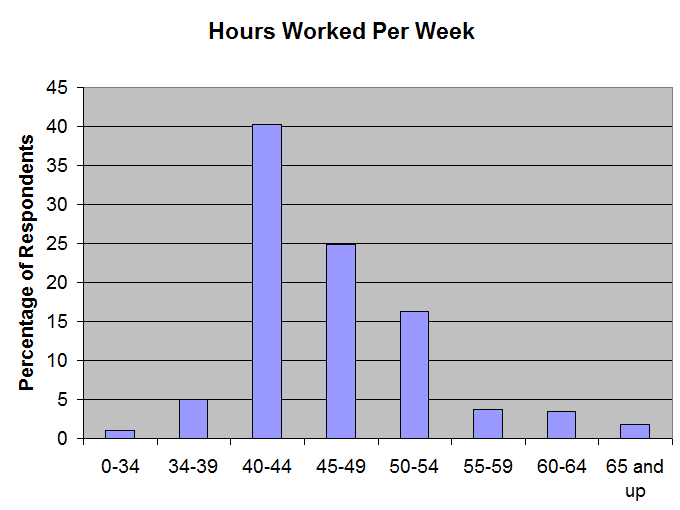
In 2006 happiness levels were highest for those working the longest weeks. In 2009 this effect reversed, with a -0.075 correlation coefficient between hours worked and happiness.
The Future
I asked how people felt about the future of engineering, giving four possible responses:
- Expect a strong demand for engineers
- About the same
- Demand likely to diminish
- It's likely to be offshored
- I'm hoping it's offshored to us!
We remain strongly optimistic, though the USA, Europe, and Canada fear offshoring. These numbers are very similar to those from 2006. The "percentage of respondents" is the percentage responding in each region:
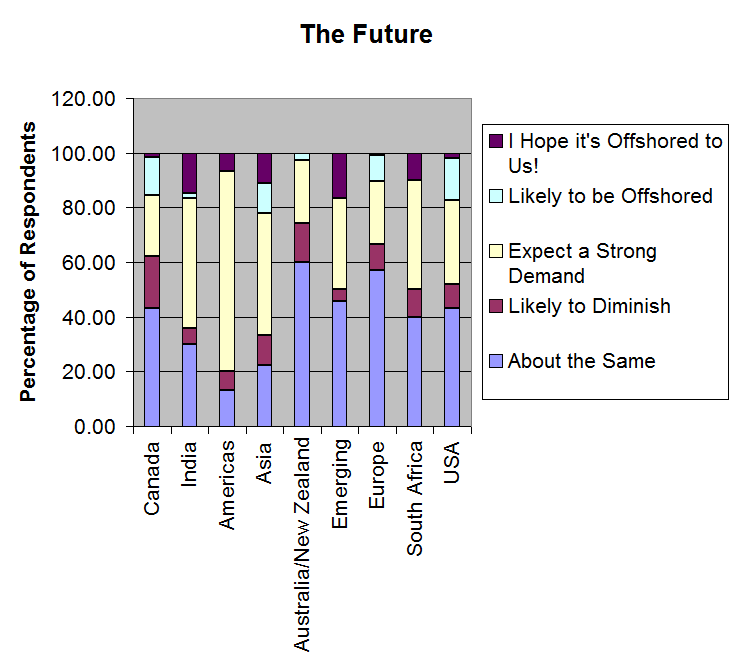
Comments
258 respondents made comments, some of which are listed here. All were interesting; some sad.Do read the last comment in this list as it is downright poetic.
25 years ago: all the engineering jobs are going to Japan 15 years ago: all the engineering jobs are going to India 5 years ago: all the engineering jobs are going to China I hope it never actually happens.
41 years in engineering has been good to me on balance. The 41 years has been a mix of commercial, industrial, and defense microcontroller/microprocessor product design/development. The trend of the last few years years seems to be all engineers are a commodity, with design engineering services to be acquired with about the level of attention given to procurement of any other commodity (paper clips, pencils etc.). I understand about competition, and showing the value of one's services, however, embedded product development is different, and requires a certain skill set. I don't see that this skill set is either appreciated, valued, or understood. The current climate at my company is to try to move all design work offshore. As an engineer, the feeling is that every Friday may be the last one here. Glad I'm nearing the end of my career, I see the younger, talented engineers around me leaving the profession, mostly as a result of the uncertainty regarding engineering job futures. In their position, I'd do the same. I'll continue playing with microcontrollers as a hobby, I still get a kick out of designing and coding a product and seeing it come to life. Not how I expected my golden years to play out.
5 months of 4 day week/pay this year. Salary above is original stated salary not what I received. Manufacturing work is being off-shored, s/w has been lucky so far but some projects already off-shore
A lot of Australia's manufacturing industry is going to cheaper countries. Design is also going with it, but not as much. There is still strong world-wide demand for Australian engineers, probably because we're willing to have a go.
Actually I am UNEMPLOYED, so maybe my responses should be ignored. I was layed off end of May 2009, getting ready to stop my mortgage payments.
After 20 years as an embedded developer beginning with wire-wrapping boards as an intern in engineering school and ending as a C++ developer, I recently finished my MBA and moved from development into product management. I love it. I enjoyed much of my work as an engineer, but wanted to be more involved in the Big Picture. However, I am making less money and working harder. But more of my compensation is tied directly to performance, so there is more upside. I saw the writing on the wall a few years ago when the large company I was working for began an R&D division in India. One of my 40 year-old coworkers had the humiliating job of training his two Indian replacements, then being forced to leave after 6 years--management simply stopped giving him meaningful work, so he left (his skills were fine, BTW--he is now working for a consulting firm). Shifts like this are going to continue to occur as technical skill sets around the world gain parity with those in the US. There are other reasons companies offshore--namely, to gain market presence in foreign countries. This is important for gaining market and customer insight, as well as supply chain reasons. It's not just about finding lower-cost workers. The US continues to offer innovators the chance to succeed (2/3 of us work for small companies). ˙There will continue to be opportunities for highly skilled engineers in our economy unless/until smaller companies have access to overseas workers. There will also, unfortunately, be more and more opportunities for government workers.
After two positions at large High Technology companies I was shocked at my most recent job to find a boss still managed by promising product to customers before asking Engineers for an estimate, removed all testing from timelines and conducted post-release meetings to re-assign blame. If that had been my first position, I would have left the industry entirely.
After working at this company for a month, I can't believe I get paid for this. Writing drivers and designing hardware all for more money than I have ever made. I love it!
As long as bean counters can raise profits for next quarter (not next year and beyond), they will continue to offshore until all of the knowledge is offshore.
Demand will diminish, partially because we have priced ourselves out of the market relative to India and China. The fact that some jobs have moved in the Asia direction has as much to do with the diminished amount of talent being turned out by our universities in North America as the cheaper cost of labor there. I see less interest from young engineers in embedded software evening courses here compared to 10-20 years ago. Poor job prospects in this sector has turned away a generation to a certain extent.
Despite some of the gloomy predictions for the embedded profession in the US, I think it's still a good choice. As boomer engineers retire, demand will increase for embedded professionals. Universities are cranking out fewer embedded engineers these days, so salaries should remain fairly strong.
Earlier this year my job was sent to two individuals in Singapore. I was told to train these two people and I was to move to another project. Two months into the new project, I got the pink slip. Talk about underhanded, that really hurt! I worked for a large company and almost all hardware and firmware development has been shipped from the US to India and the Far East.
Embedded systems is still in nascent stage in our country. Companies are reluctant to invest in this field partly because of huge hardware related costs and partly because of scarcity of embedded skill set. But I am very positive that around next five years we shall have things changed for embedded domain in India.
Even with the down economy its a great time to be an embedded guy with knowledge of power electronics due to all the investment in hybrid cars, alternative energy, etc...
Four Day work weeks for the duration, whatever that is. Bad part: 20% less pay. Really bad part: I have more work than I can do in a five day week.
How can we compare salaries without considering benefits? I work for a small company and pay an obscene $8500 a year in premiums for health insurance for a family of 3. That premium is with the employer-sponsered insurance program, after my employer's contribution. 401K match is only 25 cents on the dollar for the first 5 percent, but some small companies might not even match at all
I have been unable to obtain stable full time work since moving to Des Moines, IA in 2008. I have had two contract jobs that didn't last more than 3 months. My 2009 salary, is from a 2 month independent contract job in KC during the summer (using income - expenses). I do hate being unemployed. I've been applying to a few hundred positions outside of the area and have had no job offers.
I now believe that although demand is likely to stay around the same, salaries for embedded engineers in the US will fall in real terms for the foreseeable future. In order to maintain a lead, a person must strongly specialize.
I plan to disown my kids if they choose engineering as a profession - or at least not pay their tuition - engineering has no future in the USA.
I see more collaboration between small engineering teams in the USA and larger engineering teams in India, China and other countries.
I still love the field of embedded software & hardware development, but job satisfaction is diminishing as resources (time, budgets, and clueful management) grow scarcer. I think this would be a great hobby--if I could afford to retire.
I think the demand for competent embedded systems developers is going to explode in the near future.
I think the weakening dollar will increase demand for engineering in the US. Since technology is one of the US's biggest exports, the weak dollar will reduce the relative cost of US labor vs. other countries and will help demand for engineers in the US.
I was let go yesterday, as were a number of very talented people in Colorado and elsewhere. India, however, was not hit. I say, screw outsourcing. And if that makes me a nativist, then so be it.
I work for a product company in India, the R&D wing of a major US firm I find that in India, beyond a point technical career is not possible; you end up going up to Management roles or at best remain at a techno-managerial role. I don't see a technical career growth like in US happening here.
If I had to do it all over again I'd have been a plumber!
It has been my experience that embedded engineering is the most stable and highest in-demand field of engineering of all engineering disciplines. I have never had difficulty finding work. When the economy down-turned, all engineers in my company were furloughed except for me and the 3 other embedded engineers. We have the flexibility to work on high-level software, low-level software, embedded software, firmware, VHDL, and hardware. This provides for a change in what you do each day (job satisfaction), and job stability. There also seems to be a shortage of quality embedded engineers in the US, which increases the demand. I entered engineering school as a mechanical engineering major, switching to embedded was the best decision of my life!
Love the career. Not happy with the company.
Love the work. Hate the pay and total lack of respect. Want to keep improving and learning more. Feel proud of my achievements (products in use). England has little interest in engineers, I am sad it's taken me nearly 30 years to realise what I should have done previously - leave the UK.
My company has attempted, twice, to cheap-shore my job. Fortunately, there are issues that prevent that from happening, for now. I actually love my work. I hate that my company doesn't value what I do. My company (more than 100,000 employees) contributes to the decline of America by cheap-shoring as many good US jobs as it possibly can, and turns around and says it's a good thing. I'm a 57-year-old white male, 30+ years as a software developer, with a BS in Mathematics, whose scared to death that nobody will hire me if I lose my current job.
We're starting to add jobs in US instead of India!
Software engineering is one of the few fields that lets you be both an artist and a detective, applying the creative and analytical sides of yourself. Software engineers get to create that ethereal artifact that powers virtually every hardware construct that we interact with in our modern world. We infuse the soul into the body and make unresponsive masses come alive. Professions don't get any better than this!

